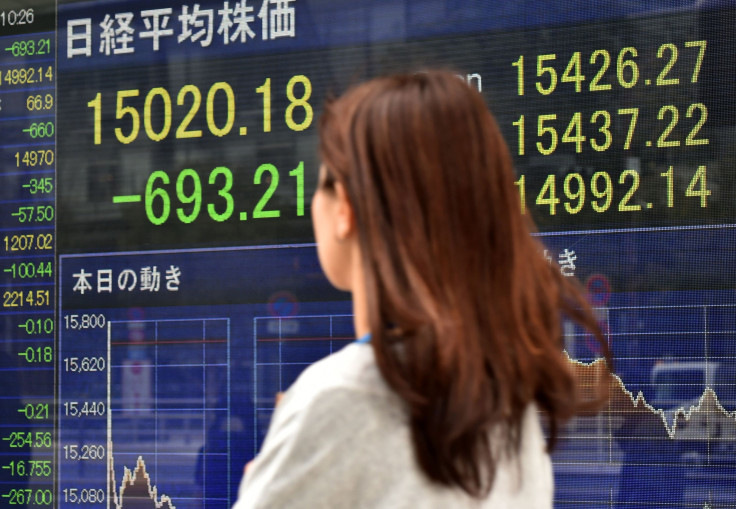European Stocks Buck The Trend, Rally After Overnight Asia Rout

UPDATE: 5:40 a.m. EST — A global rout that pushed Asian bourses deep in the red overnight eased during early trade in Europe Friday, as investors took heart from a slight rebound in oil prices. Brent crude, the international oil benchmark, gained $1.26 to $31.32 a barrel in London, a day after it dropped 2.5 percent to $30.06.
In early trading, the pan-European Stoxx 600 was up 2.12 percent. Germany’s DAX was up 1.73 percent and the U.K.’s FTSE 100 leapt 1.5 percent. France’s CAC 40, meanwhile, advanced 1.67 percent.
Shares in Germany’s Commerzbank jumped 16 percent after it reported strong gains in fourth quarter, while Deutsche Bank and Credit Suisse Group, whose shares, in the past few days, have come under a selling pressure, also rose 10 percent and 4.9 percent, respectively.
Wall Street also looked set to snap its losing streak. Dow futures rose 0.7 percent, S&P 500 futures gained 0.8 percent and Nasdaq futures rose 0.9 percent.
“Traders are thinking enough is enough, and let’s bag some bargains, and this is despite the fact that we had a heavy selloff over in Asia,” Naeem Aslam, chief market analyst at AvaTrade, reportedly wrote in a note.
Overnight, Asian markets, led by Japan’s Nikkei 225 Index, closed broadly lower, with the exception of India’s benchmark S&P BSE Sensex, which rose during the last hour of trade to close 0.15 percent in the green.
UPDATE: 1:55 a.m. EST — After a daylong trade in the red, stock markets in Japan and South Korea ended the week on a sour note. On Friday, Japan's benchmark Nikkei 225 Index closed down 4.84 percent — recovering slightly from an earlier drop of over 5 percent — while Seoul's Kospi Composite Index ended the day down 6 percent. Meanwhile, South Korea's tech-heavy Kosdaq Composite Index, which was shut temporarily after plunging over 8 percent, finished the day's trade 6 percent in the red.
Original story
The global stock market rout gathered pace in Asia Friday, led by Japanese stocks, which slumped to their lowest level in more than a year. Japan’s benchmark Nikkei 225 Index dropped over 5 percent as investors dumped risky assets in favor of traditional safe havens such as gold and government bonds.
The Nikkei 225 Index was last trading down 3.8 percent, paring its losses after policymakers hinted that they may intervene to arrest the yen’s gains. The benchmark index has been on a rapid downward spiral in recent days, even as the yen — considered a safe haven currency — has rapidly strengthened against the dollar. The Japanese currency, after rising to 110.98 against the greenback Thursday, was trading at 112.71 Friday.
“Recent foreign exchange moves have been very rough. I am very nervously watching these moves and will take appropriate steps as necessary,” Japanese Finance Minister Taro Aso said Friday, triggering speculation that Tokyo may resort to selling the yen to prevent a strong currency from hurting the export-reliant economy.
Meanwhile, South Korea’s Kospi Composite Index, which has fallen over 6 percent this year, was down 1.26 percent Friday. Trading in Seoul’s tech-heavy Kosdaq index was briefly halted after a fall of 8.2 percent triggered the country’s circuit breaker. Trading resumed after a gap of 20 minutes and the index was trading down 5.1 percent at 12:40 a.m. EST.
Hong Kong’s Hang Seng Index extended the previous day’s losses and was down 0.54 percent, while India’s S&P BSE Sensex, which plunged to a two-year low Thursday, was trading down 0.4 percent.
In Australia, where shares entered bear territory earlier in the week — impacted by a global mining crunch — stocks fell more than 1 percent, despite comments from the Reserve Bank Governor Glenn Stevens that fears of a global slump were “overdone.”
“The markets are clearly starting to price in a sharp slowdown in the world economy and even a recession in the United States,” Tsuyoshi Shimizu, chief strategist at Mizuho Asset Management, told Reuters. “I do not expect a collapse or major financial crisis like the Lehman crisis but it will take some before market sentiment will improve.”
Investors are running for cover amid concerns over the steady rout in oil prices, the stability of the global financial system and the efficacy of central banks’ policies. Traders are also worried that plummeting oil prices will destabilize credit markets and saddle banks with losses, and that negative interest rates implemented by policymakers in Europe and Japan would hurt banks’ profitability.
On Thursday, for instance, European giants Deutsche Bank and BNP Paribas both ended the day down 6 percent.
“The idea that central banks are now fully targeting the interest rate structure and putting a gun to domestic banks heads in a fight to stoke credit growth is in no way an equity friendly story,” Chris Weston, chief market strategist at spreadbetter IG, reportedly said.
© Copyright IBTimes 2024. All rights reserved.






















